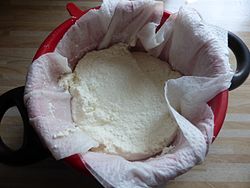

Acid-set or sour milk cheese is cheese that has been curdled (coagulated) by natural souring, often from lactic acid bacteria, or by the addition of acid. This type of cheese is technologically simple to produce.[1]
When making soft acid-set cheese using bacteria, the coagulum results from production of lactic acid by the starter microorganisms.[1]
Cheeses can be classified according to a variety of features including ripening characteristics, special processing techniques (such as cheddaring) or method of coagulation. Acid-setting is a method of coagulation that accounts for around 25% of cheese production. These are generally fresh cheeses like, queso blanco, quark and cream cheese. The other 75%, which includes almost all ripened cheeses, are rennet cheeses.
Ricotta and most other whey cheeses are made by first heating the milk to between 90 and 92 degrees Celsius to create coprecipitation of casein and whey protein before addition of lactic or citric acid.[2]
- ^ a b Jones, D.G. (2012-12-06). Exploitation of Microorganisms. Springer. p. 284. ISBN 9789401115322. Retrieved 23 March 2019.
- ^ Ullmann's Food and Feed, 3 Volume Set. Wiley. 2017-06-19. p. 584. ISBN 9783527339907.